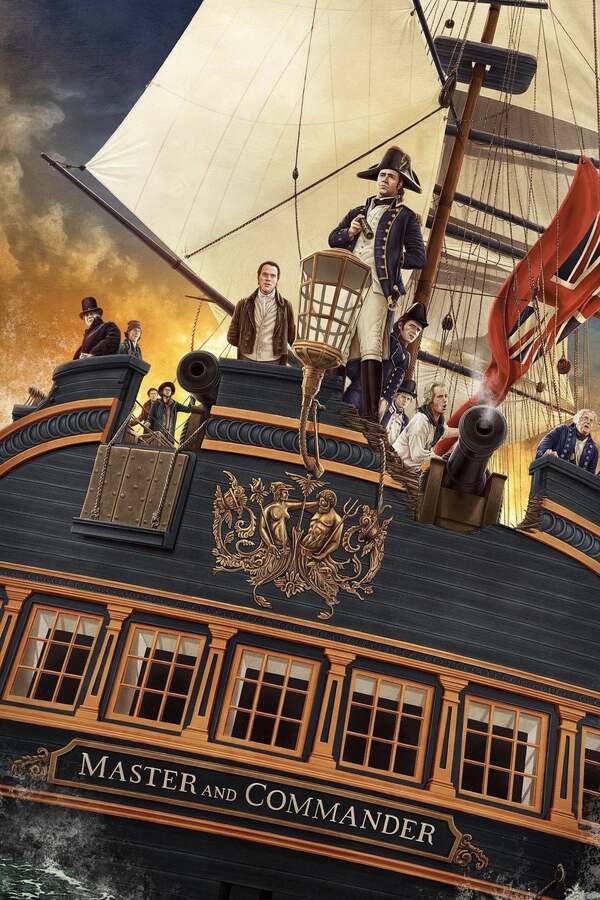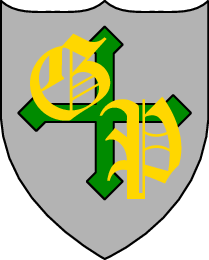Master and Commander: The Far Side of the World
Donald P. Goodman III

Master and Commander is a superlative piece of historical fiction, refreshingly free of Hollywood's common historical misrepresentation. Historical pieces out of Hollywood tend to be complete distortions of the truth, generally taking a historical incident and twisting it until it serves given ideological purposes, often presenting historical characters in utterly unbelievable roles, or voicing opinions on matters that wouldn't exist for centuries thereafter. Master and Commander is different; it presents things as they actually were. And that is a refreshing change.
While Master does not seize on any particular historical occurrence, unlike other excellent and more or less accurate historical films like The Mission or Black Robe, it represents its period, the early nineteenth century, in a flawless and uncompromising manner. Set in the middle, dragging years of the long Napoleonic wars, the movie defends notions of leadership, hierarchy, discipline, duty, and manhood in a way that no other movie has in recent years. Many of these elements go together, combining into a great sweep that keeps one riveted in the pursuit of the French ship Acheron across the wide, raging seas.
The central character is Captain Jack Aubrey, “Lucky Jack”. He is a good leader who loves his men, but will not hesitate to discipline them when it is necessary. Lucky Jack has earned the loyalty of his men, and in good story-telling fashion the movie shows this to us, and does not merely tell us. The most poignant example is the death of one of his seaman. During a violent storm while his ship, the Surprise, is rounding Cape Horn, a seaman, Warley, goes overboard, holding on to a collapsed mast for his life. The mast is held to the Surprise by its lines, and several of Warley's friends are struggling to pull him back on board before they cut those lines. However, the mast is acting as a sea anchor, holding down one side of the ship and presenting a very dangerous risk of capsizing her in the driving winds. Jack has a decision to make; should he cut the lines and thus consign poor Warley to a watery death? Or should he allow his men to continue trying to draw Warley back in, at the possible cost of the rest of the ship? Jack makes his decision; the line is cut. He shouts the order, and one of the seaman's best friends, Nagle, raises the hatchet to cut the lines. It is a hard task, and Jack does not like ordering it any more than Nagle likes executing it. But it had to be done, and Jack's leadership is such that no one questions the command and no one blames him for it. The men know that he loves each and every one of them, and would never let one die unless there was no other way. So his men remain loyal, and Jack's leadership is intact.
Later on, though, Nagle violates one of the most crucial laws of the ship: respecting, in word and deed, the hierarchy that governs all their lives. Midshipman Hollam, who has completely failed of advancement for many years and has earned the scorn of the men, is widely regarded as responsible for the ship's long marooning in windless waters. Nagle, when passing Hollam on deck, failed to salute him. Hollam is a poor officer and does not insist on the appropriate respect; Jack, however, sees this, and snaps immediately into action. A crewman failing to salute an officer is utterly unacceptable, even once; Jack orders Nagle whipped. There is no other way; the men must see what happens when officers are disrespected. But privately Jack castigates Hollam severely; it is really Hollam's fault that the men do not respect him. Hollam protests that he has always tried to be a friend to the men; Jack rejects this defense for the excuse that it is. The men, he tells Hollam, do not need a friend; they are friends with each other. They need a leader; they need an officer. And the reason they do not respect Hollam is because he has failed to be a good officer.
This hierarchy of officers and men is vital to the proper functioning of the Surprise; it is accepted without question by all aboard (except for Dr. Maturin, much infected by the modern ideas then in vogue), and true leadership presupposes it. Indeed, many viewers are surprised that some of the midshipmen (officers-in-training) are mere boys, as young as twelve, yet are dealing out orders which are unquestioningly obeyed by the much-older crew as if they were grown men. In the thinking of the time (and indeed, of almost all times but our own), this is no mystery: the midshipmen are officers, even if very young, and thus sit higher in the hierarchy which governs naval life. Of course, then, they would be obeyed regardless of their age. This hierarchy, good or bad, is what holds society in general and the Surprise in particular together; the film portrays it exactly as it is, without the typical modern judgment and disapproval.
Even Dr. Stephen Maturin, the ship's doctor and a man of liberal sympathies, comes to understand the importance of the hierarchy that is so vital to Jack's rule of his ship. Although earlier in the film he engages in a brief debate with Jack about hierarchy and tyranny (in which we are delighted to see Jack explicitly defend the former, arguing that it is natural and that tyrants are its corruption, not its embodiment), the good doctor comes to see its importance, indeed its necessity, even in his own life.
The doctor is an amateur naturalist, and has always wished to collect specimens from the Galapagos Islands. The pursuit of the Acheron brings the Surprise by the islands, and having lost the French man-of-war, the ship stops there to take on food and water, allowing the doctor to go about collecting various and sundry strange animals. During his expedition, however, the doctor sees the Acheron, anchored on the side of the island opposite the Surprise. His discussion with Jack about duty on his mind, he realizes that there is, indeed, a hierarchy, and that his duty to king and country supercedes his duty to his own curiosity. So he drops his specimens and heads back to the ship, to report the position of the Acheron to Jack. The ship raises anchor and begins pursuit; soon the battle will be joined.
The battle itself, of course, is epic, and in perfect conformity with the naval strategies of the Napoleonic wars. The historical details are frightfully good. In addition to the obligatory cannonades exchanged between the Surprise and the Acheron, we see the marines attempting to snipe the enemy on deck as the ships close, and finally we see the crew of the Surprise—officers and men, marines and seamen—board the Acheron under fire, with bladed weapons, to take her as a prize. It is gritty and realistic, but does not overwhelm the film, which does an excellent job portraying the slow, dull rhythm of naval life punctuated by brief battles of utter terror and chaos.
All in all, Master and Commander is a finely made, finely paced, and historically accurate film. Rather than trying to beat its audience over the head with the backward and stupid attitudes of its characters, it approaches those attitudes with sympathy and understanding, and even provides the audience with a defense of them. Finally, it gives Lucky Jack as a superb example of a leader, and the crew of the Surprise as superb examples of men doing their duty. It should be seen by everyone; no one will fail to profit from it.
